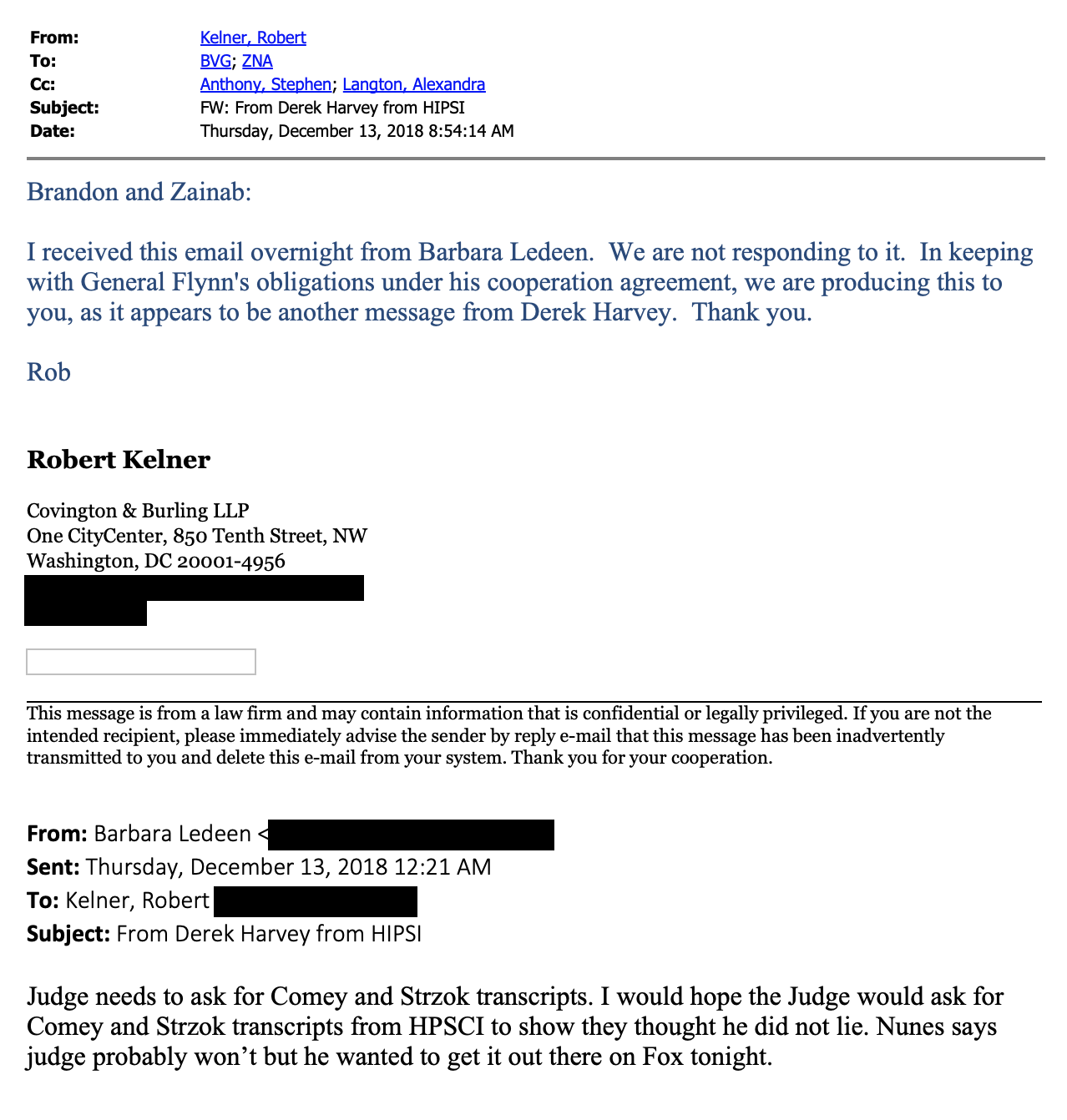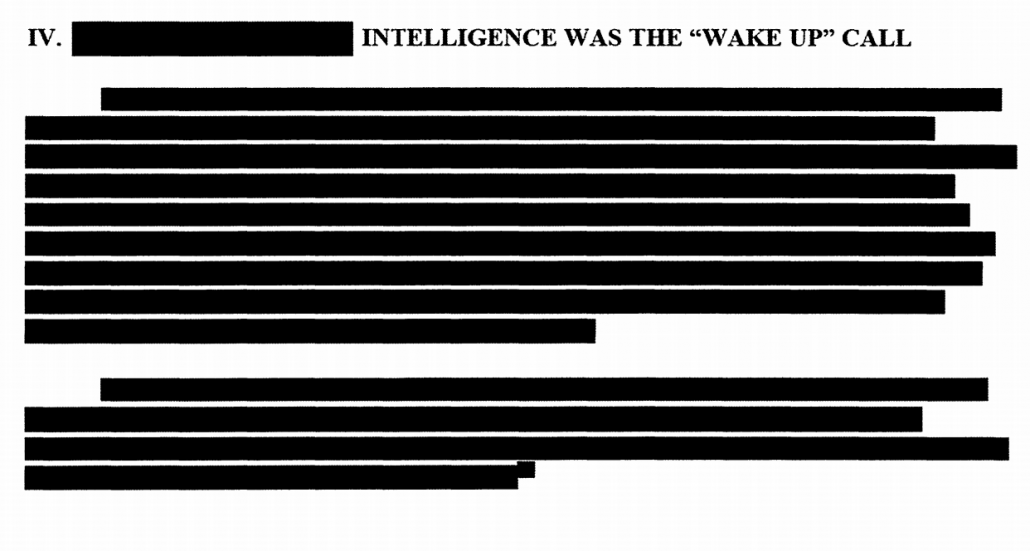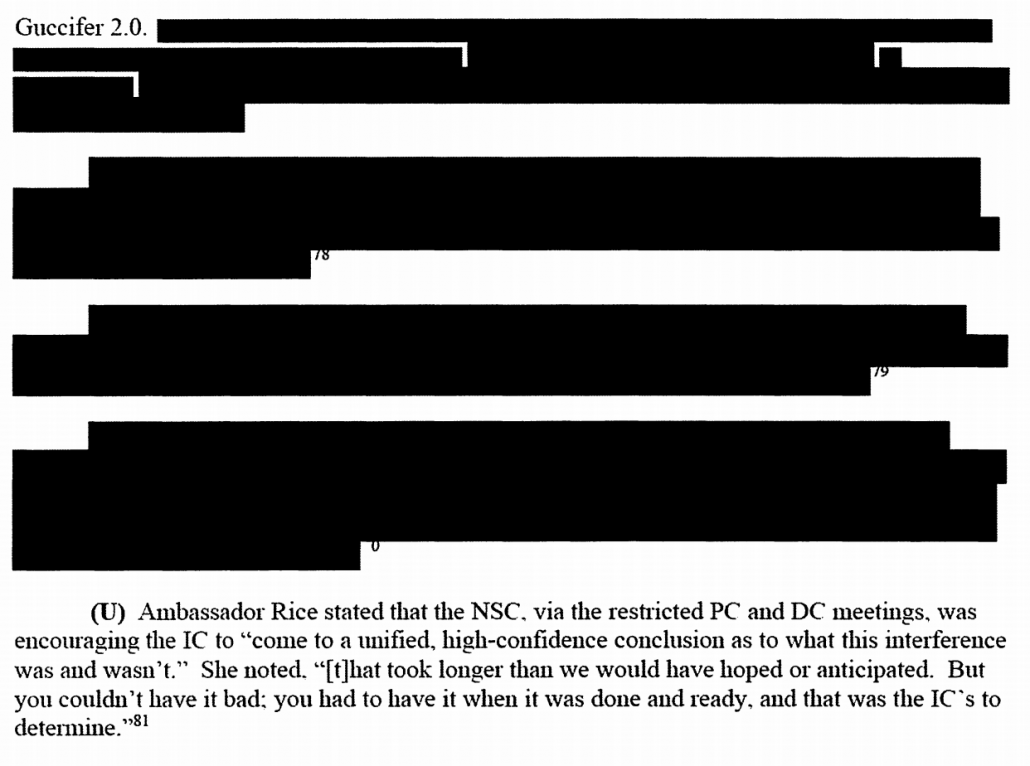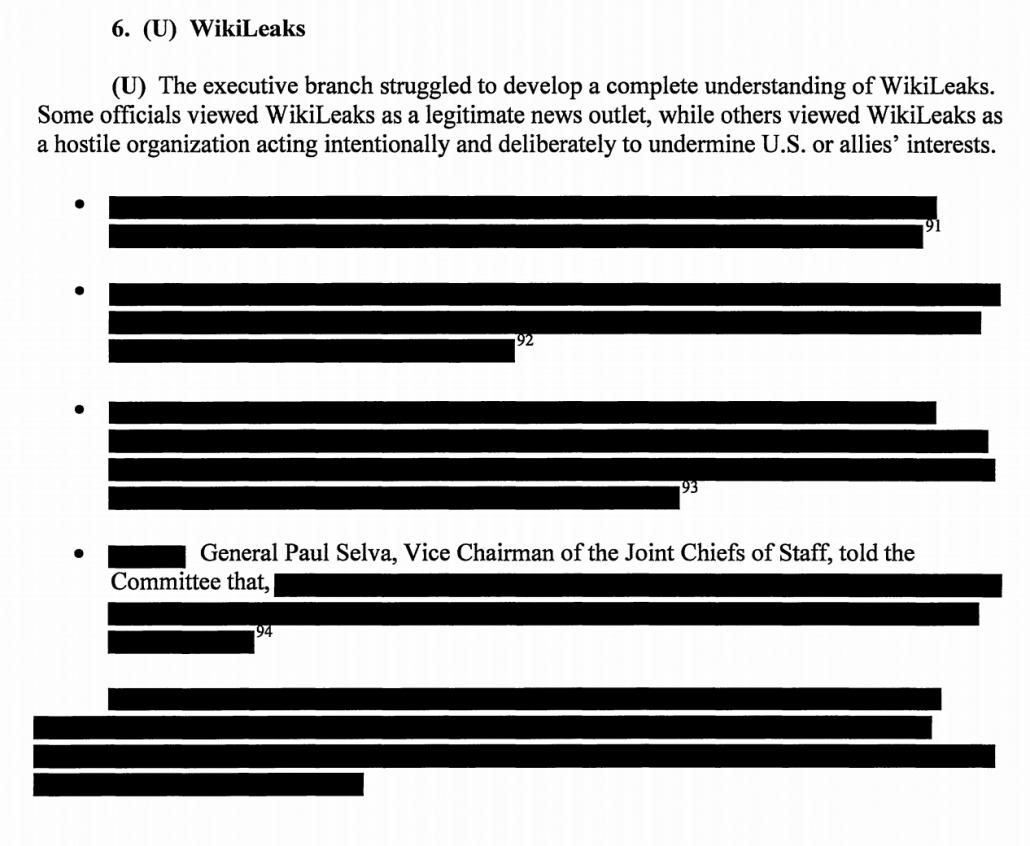Mike Flynn Collaborator Barbara Ledeen’s Past Role in Producing “New” Evidence
There are two grounds on which Emmet Sullivan, even ignoring other procedural grounds, might reject the substance of Bill Barr’s motion to withdraw the Mike Flynn prosecution.
Most of the focus has been on materiality. The Timothy Shea-signed motion’s argument about materiality is thin and conflicts with arguments Bill Barr’s DOJ made on the same issues last fall. More importantly, the argument relies on a claim that — as I noted this morning — the government not only didn’t substantiate by citing to the call transcripts, but which the government actually provided evidence that rebuts the claim.
In the case of Mr. Flynn, the evidence shows his statements were not “material” to any viable counterintelligence investigation—or any investigation for that matter—initiated by the FBI.
In a NYT op-ed over the weekend, Mary McCord refuted the materiality claims made in the filing. In a WaPo op-ed, Chuck Rosenberg recites the long list of people who have already said the lies were material:
- Donald Trump
- Mike Pence
- Sally Yates
- Mary McCord
- Mueller’s prosecutors
- Judge Rudolph Contreras
- Judge Emmet Sullivan
- Mike Flynn
Sullivan has plenty before him to dismiss the DOJ’s new claims about materiality.
Still more questions about whether any of this is “new”
But there’s another problem with the motion to dismiss, one I keep coming back to. Central to the motion’s logic is that DOJ found “new” information that caused it to change its mind about the Flynn prosecution.
After a considered review of all the facts and circumstances of this case, including newly discovered and disclosed information appended to the defendant’s supplemental pleadings, ECF Nos. 181, 188-190,1 the Government has concluded that the interview of Mr. Flynn was untethered to, and unjustified by, the FBI’s counterintelligence investigation into Mr. Flynn—a no longer justifiably predicated investigation that the FBI had, in the Bureau’s own words, prepared to close because it had yielded an “absence of any derogatory information.” Ex. 1 at 4, FBI FD-1057 “Closing Communication” Jan. 4, 2017 (emphases added)
1 This review not only included newly discovered and disclosed information, but also recently declassified information as well.
[snip]
Based on an extensive review of this investigation, including newly discovered and disclosed information attached to the defendant’s supplemental pleadings, see ECF Nos. 181, 188-190, the Government has concluded that continued prosecution of Mr. Flynn would not serve the interests of justice.
This motion cites to two documents (one, two) from Covington that would be new to the government. The Bates numbers on both, however, indicate this was almost certainly not new production to Flynn (the belated discovery Covington turned over in recent weeks should have Bates numbers in the 600,000 range, and these have Bates’ numbers under 200,000; moreover, Covington had already turned over everything pertaining to Bijan Kian, as any discussion of Mike Jr would be). If Flynn had them, he could have submitted them last fall or in January when he made his own arguments about being railroaded — but had he done so, it would have been (further) proof Flynn perjured himself if they showed the government had made such promises, because he denied it the first time he pled guilty. Moreover, these two documents are entirely unrelated to anything in this motion, which pertains exclusively to Flynn’s lies in his January 2017 interview.
The other newly disclosed documents (the Shea motion cites the same ones twice, a hint that whoever actually wrote the motion wasn’t really relying on the documents) are all FBI documents, and so, by definition, were all in possession of the government. While DOJ might try to claim that DOJ didn’t have the documents, the documents pertain to two issues — January 23, 2017 and January 24, 2017 meetings discussing what to do about Flynn, and communications between Peter Strzok and Lisa Page — that have been repeatedly reviewed by DOJ, which means it is exceedingly likely the materials were in possession of and and had been reviewed by DOJ at least once if not several times. Moreover, the Shea motion suggests these files were previously classified, which is a tell that Shea has lost track of where the government, which controls classification, ends and Mike Flynn’s defense team begins.
Plus, in his CBS interview last week, Billy Barr confessed that John Durham has already been looking at this.
I made clear during my confirmation hearing that I was gonna look into what happened in 2016 and ’17. I made that crystal clear. I was very concerned about what happened. I was gonna get to the bottom of it. And that included the treatment of General Flynn.
And that is part of John Durham, U.S. Attorney John Durham’s portfolio. The reason we had to take this action now and why U.S. Attorney Jeff Jensen came in was because it was prompted by the motions that were filed in that case. And so we had to sorta move more quickly on it. But John Durham is still looking at all of this.
If Durham received these documents anytime before November 1 (Sidney Powell first demanded such things in a letter to Bill Barr sent on June 6, 2019), then the defense of Flynn’s prosecution that Bill Barr’s DOJ submitted last November would have had an opportunity to incorporate these documents. In either case, that defense of the prosecution rebutted both claims made here. It called the investigation legitimate. It specifically rebutted the claim that Flynn had been caught in a perjury trap.
Congressional staffers were tipping Flynn about which files to demand
But Judge Sullivan has in his possession a more damning piece of proof that DOJ has been aware of these documents — and Mike Flynn’s interest in them — even before Flynn pled guilty again on December 18, 2018. Back in October, the government submitted an exhibit of a Rob Kelner email forwarding Brandon Van Grack and Zainab Ahmad an email he received from Senate Judiciary Committee staffer, Barbara Ledeen. In it, Ledeen tells Kelner that Derek Harvey, one of the House Intelligence Committee staffers who had dug through everything they could find at DOJ to claim abuse in the Russian investigation, urged her to get Judge Sullivan to ask for Jim Comey and Peter Strzok’s HPSCI transcripts so his boss, Devin Nunes, could air the transcript on Fox News (he was also one of the Nunes staffers who met with Rudy Giuliani’s Ukrainian grifters). The government submitted as proof that this is all about ginning up the base (though they didn’t describe it in those terms).
Flynn pled guilty again after being alerted to one of the “new” documents
Flynn’s lawyer received this email five days before Flynn stated, under oath, that he knew he was giving up his right to complain about the circumstances of his interview forever.
THE COURT: Do you wish to challenge the circumstances on which you were interviewed by the FBI?
THE DEFENDANT: No, Your Honor.
THE COURT: Do you understand that by maintaining your guilty plea and continuing with sentencing, you will give up your right forever to challenge the circumstances under which you were interviewed?
THE DEFENDANT: Yes, Your Honor.
And then Flynn pled guilty again.
Comey’s transcript is one of the things DOJ submitted last week to justify deviating from DOJ’s judgment on November 1, 2019, that Flynn’s prosecution was just. It doesn’t say what Harvey claimed it said, but instead says the experienced agents didn’t find Flynn exhibited any indications of deception.
And the agents — and the reason I mention their experience is because I talked to them about this — they discerned no physical indications of deception. They didn’t see any change in posture, in tone, in inflection, in eye contact. They saw nothing that indicated to them that he knew he was lying to them.
That said, it’s proof that DOJ has long been aware of concerns about the claimed content of this and other filings relied on last week.
But that’s not why I find this email particularly damning — and worthy of further attention.
Barbara Ledeen helped Flynn to try to find Hillary’s emails; her spouse helped Flynn prep for his call with Kislyak
As noted, Barbara Ledeen is a staffer on the Senate Judiciary Committee, meaning she worked for Chuck Grassley and now works for Lindsey Graham. She’s almost certainly the mastermind of their efforts to declassify every little thing that might undermine the Mueller investigation.
I’m fine with transparency — though given the way Ric Grenell hid Sergey Millian’s name in a transcript on the Russian investigation and given the way Bill Barr has made claims about the Flynn transcripts without declassifying them, we’re not getting it.
But Ledeen’s role goes beyond getting things that undermine Trump’s critics while hiding key facts that wouldn’t.
As the Mueller Report laid out, both she and her husband Michael play key roles in this saga. While a Senate staffer, Ledeen started searching for Hillary’s missing emails as early as 2015. She wanted to reach out via cut-outs to hostile intelligence services and ultimately claimed to have found emails on the dark web.
Barbara Ledeen and Peter Smith were among the people contacted by Flynn. Ledeen, a long-time Senate staffer who had previously sought the Clinton emails, provided updates to Flynn about her efforts throughout the summer of 2016.266 Smith, an investment advisor who was active in Republican politics, also attempted to locate and obtain the deleted Clinton emails.267
Ledeen began her efforts to obtain the Clinton emails before Flynn’s request, as early as December 2015.268 On December 3, 2015, she emailed Smith a proposal to obtain the emails, stating, “Here is the proposal I briefly mentioned to you. The person I described to you would be happy to talk with you either in person or over the phone. The person can get the emails which 1. Were classified and 2. Were purloined by our enemies. That would demonstrate what needs to be demonstrated.”269
Attached to the email was a 25-page proposal stating that the “Clinton email server was, in all likelihood, breached long ago,” and that the Chinese, Russian, and Iranian intelligence services could “re-assemble the server’s email content.”270 The proposal called for a three-phase approach. The first two phases consisted of open-source analysis. The third phase consisted of checking with certain intelligence sources “that have access through liaison work with various foreign services” to determine if any of those services had gotten to the server. The proposal noted, “Even if a single email was recovered and the providence [sic] of that email was a foreign service, it would be catastrophic to the Clinton campaign[.]”
In a sane world, Ledeen would have been fired when this all became public, not least because she engaged in some of the same kinds of behavior that the frothy right complains Christopher Steele did (given that she was pursuing these issues in her oversight role, too, it’s unclear how well this effort was bracketed off from her taxpayer funded work). Instead, she’s leading the fight to discredit the investigation into this and other efforts.
The role of Ledeen’s husband is even more notable. The first person Flynn spoke to after Russia reached out to him — even before he spoke with his Deputy, KT McFarland, was Ledeen, who was then a Transition staffer.
Russia initiated the outreach to the Transition Team. On the evening of December 28, 2016, Kislyak texted Flynn, “can you kindly call me back at your convenience.”1229 Flynn did not respond to the text message that evening. Someone from the Russian Embassy also called Flynn the next morning, at 10:38 a.m., but they did not talk. 1230
[snip]
Flynn recalled that he chose not to communicate with Kislyak about the sanctions until he had heard from the team at Mar-a-Lago.1241 He first spoke with Michael Ledeen, 1242
While Michael Ledeen’s call records were subpoenaed, there’s no record Mueller interviewed him about his calls or even tried.
There are many reasons to believe that little, if any, of the documents relied on last week were new to DOJ at all, especially not new since the November 2019 filing rebutting all the arguments DOJ is now making. Just as importantly, the history in this case going back years is that “new” is not a legal term, but instead a propaganda one, one designed to feed Fox News. And it’s a propaganda effort led, in part, by someone deeply, personally implicated in Flynn’s actions.
Without affirmative proof any of this is new (and DOJ has offered none), DOJ has no procedural basis to flip-flop from the position Bill Barr’s DOJ argued aggressively last year. In the past, at least, by “new” Flynn’s backers and collaborators really only meant “Fox News.”












